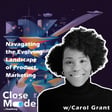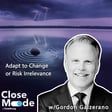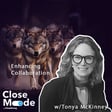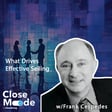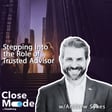Become a Creator today!Start creating today - Share your story with the world!
Start for free
00:00:00
00:00:01

The Art of Reducing Admin Work in Sales w/Kevin Lehman
In this episode, Brian Dietmeyer talks with Kevin Lehman, a BDR Manager at PandaDoc, about the evolving landscape of enterprise sales and the critical role of technology in enhancing sales processes. They explore how tools like PandaDoc have transformed proposal creation and tracking, significantly reducing administrative burdens for sales teams. This insightful discussion also delves into the broader market shifts affecting sales strategies and the importance of adapting to these changes to stay competitive.
Timestamps:
- 00:03 Introduction to Kevin Lehman and PandaDoc.
- 00:44 Origin story of PandaDoc and its impact on proposal creation.
- 01:30 Discussion on administrative burdens in sales and the value of efficiency.
- 02:26 Kevin's perspective on internal vs. external challenges in sales.
- 03:36 The shift in sales focus from product-centric to customer-centric approaches.
- 06:01 Understanding the buyer's journey and tailoring sales messaging.
- 10:14 Importance of industry and product knowledge for sales reps.
- 13:06 Strategies for gaining confidence in sales pitches.
- 15:39 Challenges in customer decision-making processes.
- 19:28 Enhancing buyer experience through informed sales strategies.
- 22:16 Closing thoughts and the future of sales enablement.
Transcript
Introduction of Show and Guest
00:00:05
Speaker
Hello and welcome to another edition of closed mode, the enterprise sale show. I'm Brian Deitmeyer, CEO of closed strong AI, the home of precision guided selling. And today I'm really lucky to be here with Kevin Lehman, who's a BDR manager at Panda doc.
00:00:19
Speaker
ah Kevin also in his part-time is a meal server and a fruit harvester, which we probably won't have time to get into. He he did report to me last time that those skills aren't extremely current. So if for those of you who aren't familiar with Pantadoc, they make really cool proposals and also create, manage, and and track, e-sign, that sort of thing. So I do love, Kevin, welcome to the show, by the way.
00:00:43
Speaker
Thanks, Brian. Excited to be here.
Market Shifts and Customer Decision Leadership
00:00:45
Speaker
ah We were but where um thinking about this segment as like competing and in the new economy stuff has changed and we're talking about market shifts and we were, you know, all of us kind of know we're finishing each other's sentences. It's 2x versus 6x by committee buys, longer deal cycles, lower win rates. And, but we we both started talking about something that's near and dear to my heart, which is something to help us compete, which is.
00:01:09
Speaker
leading the customer's decision, which is likely broken their decision process versus ah understanding it. So we're going to get into that in a moment, but my first question for you has to do with something you mentioned.
Internal Analysis Over External Blame
00:01:21
Speaker
As we were talking about all these market shifts, you were wondering how much of the difficulty in doing deals is, is wrongly blamed on external factors and maybe there's things internally. Yeah. Can you tell, tell me a little bit more about that?
00:01:35
Speaker
Yeah, I think it's an interesting thought exercise. If we if we look back at the last few years, right, we can't discount what's going on with the economy, making money tighter and all of that. But yeah I also think when there's these these big macro shifts,
00:01:51
Speaker
It helps uncover that what we were doing maybe wasn't really logical or or best practice from what we what we were taught or the the fundamentals of of selling at the end of the day.
00:02:04
Speaker
and and so i think right it's It's kind of easy to to blame the economy and all of that, but I think we also have to be accountable to ourselves and the quality of work that we're doing. And I think that's that's one thing that has really stuck out to me is is just like from a logical perspective, right?
Prospect Experience vs Self-Promotion
00:02:26
Speaker
yeah If we're thinking through what's a ah good experience for our prospects and customers,
00:02:34
Speaker
is it really mass blasting out hundreds of emails, all talking about our product, our solution, how we're the best, which clearly isn't biased at all, by the way, right? um and and and And none of our focus is is on them, right? And I think that's that's something that we have to be accountable for, where,
00:02:57
Speaker
the idea that that we can just only talk about ourselves, only only celebrate our accomplishments. If you were doing that with a friend, you wouldn't really have that friend for for too long, right? So I think it's an interesting thought experiment. because I always like to think of things just like in a logical way and and try and incorporate psychology in there. And and really if you if you look back at what was commonplace over the last five years and hopefully some of that has has started to shift a little bit, but it really doesn't make sense. And so I think you know when thinking through only a limited percent of your of your market is is really
00:03:40
Speaker
you know, in the in the market for your solution right now, there's only I think it's like two or 3%. Right.
From Understanding to Leading Customer Decisions
00:03:45
Speaker
And sure, what we're doing might work for them. But for that vast majority at 97 98%, just talking about us just talking about our accomplishments, our achievements, the the companies that we work with, it's just not really going to work. yeah And so I think that's something Yeah. And Kevin, I think overall just that, that lens, right? Looking through the lens of, okay, let's stop blaming it on, you know, tight money or anything else. I think that's really helpful. So when yeah the the thing that we morphed into is talking about this, this kind of one aspect of selling, which is leading versus simply understanding. Many of us were taught in the past, you know, what, what is the customer's decision process? And we were talking about, yeah, that just doesn't work anymore. Give me give me your your view on on that, like define that a little bit.
Tailoring Approaches to Buyer Journey
00:04:36
Speaker
Yeah. So I always come back to understand or trying to understand where the buyer is at in their view of you. I think of it as the buyer's journey.
00:04:49
Speaker
right You're gonna have people who have a ah very good understanding of your product, your solution, and they could be actively evaluating you. You also have people that have never heard of you before. And you have to treat those people completely differently yeah ah in terms of the messaging you're using and and all of that. So I think it's just trying to have that awareness that Just because you know you you may think that you're a ah bigger name in the market, not everybody is gonna have a good understanding of who you are or what you do.
00:05:28
Speaker
And really you you have to kind of focus everything around that is that should be almost like the beginning. If you're trying to reach out to an account, like just get a base level understanding or a a point of view of do they even know who we are, right? Do they know that we have a problem that we can solve? I think that from there starts to give you a line of questioning and give you a perspective on on how to approach an account.
00:05:57
Speaker
And yeah, I agree. And it struck me when you said that because now I'm in a situation of selling something that's new. And and before I was in a situation of selling something that everyone understood and and you're right. It's a completely, it struck me when you said that it's it's a completely different frame. So, uh, customers are, are struggling with decisions. And when we talked about moving reps and we'll talk in a moment about like what tools and support they need to be able to make this shift. And we talked about reps.
00:06:27
Speaker
moving from understanding customer decision to to leading it and providing insight you talked a little bit about the confidence reps need to be able to make that shift which i think is this is a <unk> a big behavior change i think the core of selling is.
Confidence in Sales Discussions with Executives
00:06:41
Speaker
yeah What is the customer's decision ah yeah so talk a little bit about that confident shift and maybe what helps them make that make that shift.
00:06:50
Speaker
Yeah, I think it's a ah really important point. The ah team I manage is in the BDR world. right So it's a lot a lot of folks who are or maybe a little earlier on in their selling career. i And when they're approaching these these larger companies, there's almost the the tendency to think that they know more than we do. right you're go You're going to a director VP level person They're very experienced. right They have a good understanding. They work at this awesome company. They they must know what we do and all of that. right In reality, we take up such a a small small percentage of their brain and they might not have any expertise in your product domain at all. right and and I think just almost flipping that mindset a little bit where
00:07:40
Speaker
You spend so much time doing this, right? Evaluating ah if, if companies are a good fit for you, you have a good understanding of who your customers are, what industries particularly benefit from your solution. And I i think that can't be lost in the grid scheme of things when in reality, such a small portion of their day is dedicated to this. So I think it's a little bit just like reframing your mindset a little bit. Yeah. it's At least the start.
00:08:09
Speaker
It's it's so important to you know we're talking about the difference between like a veterinarian and a neurosurgeon right that that customers are veterinarians you know there's different critters walking into their office all day long the different stuff that they're buying where you know neurosurgeons and maybe a spinal neurosurgeon it's like I'm an expert at this thing and that's That's what what we are right we we understand we watched a lot of people buy and implement these kind of solutions and and and i think you're right to say how do we build up the confidence in the reps. To be able to know that they're they're bringing a lot of chops to the table but in order to do that i feel like we've.
00:08:45
Speaker
they they need some tools.
Tools and Data for Sales Reps
00:08:47
Speaker
you know what So it's one thing to to tell them that, but to build that confidence, they need tools. So if a rep's going to come in and ah basically advise a customer on on the best way to make a decision to source your kind of a solution, ah what sort of tools and and weapons and insight do they need to execute against that? I think it's a really good point because if you use that same analogy, right? the the neurosurgeon, right, they are an expert in their field. And that's what gives them the credibility to go to somebody and say, hey, you have this problem, right? It's because we trust that person. yeah Could be based off their education. It could be based on in the conversation you have with them, they they show their credibility. So I think from from a rep perspective, how that translates out into the field is you need to have strong industry knowledge. You need to have strong product knowledge.
00:09:43
Speaker
And you need to actually do your research on the company or have talked to somebody lower level at the company. And I think with that, that gives you a little bit more credibility to go to a person at an account and say, hey, I've heard that this is going on at your company, or I read in your 10K that you're focused on these couple things, whether it's expanding to a new ah region, whether it's trying to grow your revenue by this amount, right? and And that gives you a little bit more credibility to come in with a point of view and say, hey,
00:10:18
Speaker
right These are clearly priorities for your company. We've we've been working with with other companies that were going through that exact change in their business. And what they realized is they were having problems with this but yeah particular part in their processes. right Is that at all what you're seeing? right and And I think when you come in with that approach of of you know doing your research, but also being curious,
00:10:46
Speaker
it just opens way more doors and makes the conversations flow a lot easier. And and in terms of like the confidence for reps, I also think when you're trying to ask somebody who's more senior level than you for for time out of their busy day, right but that's like the most precious ah resource everybody has right is their time. If you look at anybody's calendar, it's usually pretty jam-packed.
00:11:13
Speaker
so them taking 30 minutes to do a call with you and feeling like they're not going to get anything out of it it, it makes it for the rep tougher to ask for that conversation in the first place. So I think you have to you have to almost frame the the conversation as something that they're going to get out of it. It could be stories that ah that ah similar companies have ah gone through. It could be sharing industry level insights about and about like particular processes, right? And hopefully that naturally leads into your product or your solution. But I think that helps really gear up the conversation and and and prime it to be more successful overall. And that helps reps get the confidence to to ask for those meetings.
00:12:06
Speaker
Well, it's interesting too, because you you you make me think about, you know, years ago, the corporate executive board came out with buyers are, you know, what, 60 to 80% through their journey before they contact us. And ah chief sales officer insights came out with a report recently, a buyer study that sellers are ninth out of 10 places buyers go
Adapting to Informed Buyers
00:12:27
Speaker
for insight. So we've known for years that that buyers have a ton more data, you know, we're we're all aware of this. But but do you think Have we reacted like this has been out there for, have we reacted well enough? Are we giving sellers what they need to to make that shift to say your role is in what it was, right? But here's what your role is and here's the content and the insight that you need. How well do you think we've made that transition?
00:12:54
Speaker
Yeah, I don't think we're there yet. I think companies are starting to realize that the internal data they have is very valuable. yeah And I think we've started to make this shift to where you see companies out there starting to use like anonymized customer data as as a resource and an insight for other companies. I think that's a really a really good use of company resources because That's not really just a sales thing at the end of the day, right? that That could be you need support from your marketing team. It could be you need support from an internal data science or analytics team. And I think that's where we need to head a little bit, right? where
00:13:41
Speaker
the information that we have, we are able to, uh, you know, eloquently transfer it to our yeah prospective customers. yes Right. And you, yeah. And you just said it though, it's, it's distributed. The knowledge is there. If I heard you right, the knowledge is there, but it's distributed in, and whether it's data or people's brains, and it's like, it's corralling all of those insights and then turning those into tools and weapons that reps can use. And and I quite frankly agree with you. I don't.
00:14:09
Speaker
I think the CEB report was right on. I think as they defined the role of sellers was was accurate as well. But I agree with you that we haven't really made that shift. Going back to customer decision making a little bit, we talked about it you know being slower and and you know no decision on the rise. what What's your perspective from kind of a frontline perspective about why why why are why are customers wrestling with decisions these days?
Tech Competition and Market Buzzwords
00:14:39
Speaker
So the easy answer, right, is that money has has gotten tighter. I think overall, what I've noticed as well, and and it makes a lot of sense is way more tech companies have popped up, right? Which means there's so much competition in technology and that could be within your specific niche, but it also impacts, you know, even if it's not a direct competitor of yours,
00:15:08
Speaker
you're still competing with everybody for a buyer's attention, right? yeah ah if you're If you're selling to a marketing leader or a sales leader, you're not just competing with your direct competitors, you're competing with everybody that sells to those people. There's only so much limited time that that somebody has in their day to to evaluate new technology. And it's, spoiler alert, it's not very much.
00:15:32
Speaker
i also think I also think there's there's so much overlap in how companies are describing their technology. And that technology in reality is actually very different, but but we're almost kind of using the the same buzzwords that don't really describe what we do. And so that almost creates some some confusion for the buyer about what actually they need and and what's going to solve their problem.
00:16:02
Speaker
Yeah, I think but you you put the onus clearly back on us to to make that definition. And that was what we were talking about last week is is really, and and it's interesting to me, it's not helping the customer to buy your stuff. It's like helping the customer to to buy and source your category. What's the way you should be thinking through this? you know Who should be involved? What are the criteria? you know How are you tying that back to your your KPIs and your business results?
00:16:29
Speaker
And that's that's that shift that is is part of that insight we're talking about is, yeah, you're struggling with this. Let let me be that resource for you. let me So I'm not ninth out of 10 places you go. Let me be a resource to take some of that complexity out of your decision process and help you filter through the noise. and And it's funny because I was i was talking to someone on a podcast a couple months back and he said one of his competitors did that. they They provided a spreadsheet, basically a weighted attribute decision matrix to help the customer make decisions to source this category. And and the the gentleman I was talking to said, we were out. Right. once Once they did that and they were using the competitors tools to guide their decision process. He said, we we were, we were gone. So I don't think that's going to happen always, but.
Guiding Customers through Complex Buying
00:17:18
Speaker
It's a good example of of how that's used and you know this this notion of you know what's the customer's by-process. every Every data point in the world shows us right now that that by-process is broken. but There's a ton of people involved. they They don't know how to do it. As you point out, they don't do this very often, so they're not great at it.
00:17:37
Speaker
100%, right? they're They're maybe buying this technology once every few years. We're selling it every single day. And that means that we, in some ways, know everybody on their end who will be impacted, who will be involved in the decision. i And it could be somebody who's never bought this technology before. So um you have to you have to take control of the of the sale a little bit and and realize that you have the experience there. And I think that's why the the example you brought up about setting over the spreadsheet is is
00:18:15
Speaker
So smart because you're really just doing the work for them at the end of the day, right? You're, you're making their buying process easier and the the easier you can make it. I think the more willing that they're going to become a customer. Yeah. I mean, I'm i'm sure you can, and maybe other people listening, I can think back to deals that I lost for the wrong reasons, you know, some, some we lost legit. And then there's other times when. It gets it down to like a buyer had a focus on a criteria, right? and And it's like, okay, this is like so present and this is part of I used to teach decision making, but this is part of it. It's like that criteria is super present in my mind. But by the way, that's not the most important one. And by the way, there's 12 other ones that you need to be.
00:18:58
Speaker
And that that's the part where I think they make mistakes. And again, we we lose deals for the wrong for the wrong reasons, but but we don't so we don't understand and we don't lead. Yeah, this is it's just super helpful. and And one of the things that that really came out for me in this discussion is this idea of, have we made the transition to two leading yet? Have we changed our role? We know the buyer's role has changed, but
Adapting Sales Roles for Market Leadership
00:19:23
Speaker
have we changed our role? And I do fundamentally agree with you. we haven't gotten there And I also fundamentally agree with you that that stuff exists. We just need a very prescribed effort for pulling it together and turning it into tools and weapons that reps can use. And to your point, yeah raising their confidence about making having that role shift.
00:19:43
Speaker
Definitely. Yeah. And I think right there's a couple other things that we can do, right? It all comes down to, in my opinion, what your your training is, what your incentive structure is, how you work well with other teams internally, and then what your what your processes are. And I think you can really dive into each of those and start to make changes to what your current processes are and and ultimately you'll you'll start to see that whether it's on the the training aspect and just kind of training reps more so on the different stages of the buyer's journey and how to
00:20:24
Speaker
lead the sales cycle a little bit more or yeah make it easier for your buyers to buy from you. right and And I think that's why your point about, hey, most companies are getting 70% through the sales cycle before they reach out to you. I think that's not just a sales problem. That's SDRs. That's marketing. That's your your partner team as well. So yeah it it really spans all go-to-market teams. And I think that there's A lot more progress to be made on that front. yeah Now this has been yeah been super generous with your time, not only on this call, but in prepping for this and and your
Learning and Continuous Improvement
00:21:02
Speaker
ideas. And it's it's just fun for me to talk about frontline ah tools and weapons and how are we competing in in this new world because we we have a long way to go. So really, really appreciate you sharing your insights here.
00:21:17
Speaker
Of course, yeah, it's great to chat with you. i I always like hearing different perspectives on this this type of stuff. And I think the the more that you can hear what others are doing, the successes they've had, the failures, it's it's going to just help us move in the right direction. So yeah, I agree. shot and you yeah and And for folks who who are listening, we have, you know, about 80 podcasts and we've got them in categories now. So if there's, whether it's,
00:21:43
Speaker
you know sales enablement or forecasting ah it's it's sitting in categories and I think you're right Kevin it's it's great to hear what other frontline professionals are wrestling with so appreciate you adding to that body of knowledge to a great degree. Yeah of course it is great to be here I think it's all about just trying to get that that one percent better on a daily or weekly basis in those different categories right so I think just trying to split those up and and trying to continually learn ah And each of those different categories, it's important to your role. And and and that's really how in six months a year you make huge changes to your company. I agree. Thanks.
